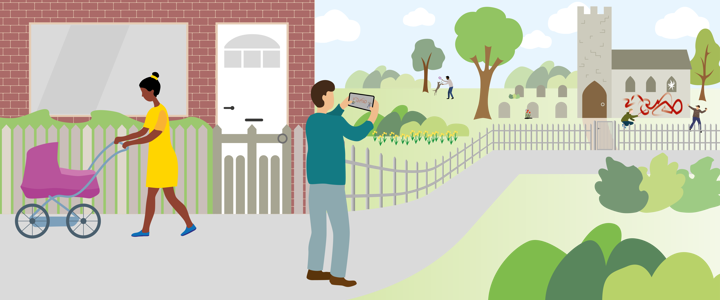Crime prevention in your community

Not all crime can be tackled by a community, but in partnership with police and your local council, you can help prevent crime. The first requirement is to know and understand what are the signs of specific crimes in your community.
Could you or your group be responsible for raising awareness in your community? Maybe hold information sessions or send regular awareness updates via your village social media?
Case study
The Gamlingay Community Safety Group was created by local residents with an aim to drive village-wide schemes and campaigns to help residents and business in being a safe place to live and work.
Gamlingay Community Safety Group
Gamlingay saw an increase in car crime in 2018 with cars broken into, wheels stolen off cars, the church roof lead was stolen as well as mindless vandalism.
One evening, after a Parish Council meeting was held to find a solution for these issues, a group of 8 residents exchanged phone numbers and the Gamlingay Community Safety Group (GCSG) was born.
The Gamlingay Community Safety Group’s aim is to drive village-wide schemes and campaigns to help residents and business in being a safe place to live and work. By raising crime prevention awareness through social media and having a display stand at local events, ie the Gamlingay Show, Christmas Fayre, Friday morning Connect Café, Thursday evening Youth Club, Police Community Support Officer (PCSO) surgeries and Neighbourhood Watch evenings, allows them to display and hand out a variety of leaflets, as well as selling crime prevention products. Items for sale include time switches, purse dipping bells, personal alarms, UV marker pens, RFID key blockers, contactless card protectors, as well as number plate anti tamper screws, all supplied by a trusted supplier.
GCSG liaises with appropriate agencies, for example the Police and local government, where they gather trusted and accurate information for their residents. GCSG, through South Cambs District Council, also receive regular updates from Cambridgeshire and Peterborough Against Scams Partnership.
Social media has become such a powerful way to pass on information instantly, so they update their Gamlingay Community Safety Group's Facebook page on a daily basis. Scammers are using such a variety of different technology through text, emails and phone calls every day, GCSG recommend being suspicious and question all uninvited approaches.
Their initial funding came from Gamlingay Parish Council (who sponsor GCSG) and a local village Fund, but they also generate income from sales of prevention items as well as donations. They created a group logo and have printed high-vis vests and identification badges for members and volunteers.
Because the Committee of GCSG are also Gamlingay Neighbourhood Watch coordinators, they have decided to amalgamate the two organisations and in addition, they are now building a close relationship with Rural Watch.
GCSG’s aim is to invite and recruit more volunteers so anyone with a desire to help them with their aims of 'Awareness', 'Liaison' and 'Prevention' is welcome. They need more volunteers to maintain the level of support given. GCSG also want to expand the Neighbourhood Watch Scheme by encouraging residents to join the village Neighbourhood Watch scheme, even to become a local street coordinator, as this will continue to discourage criminal activity.
Gamlingay is one of the safest villages in the county of Cambridgeshire, but Gamlingay Community Safety Group still needs everyone to be vigilant and report anything out of the ordinary by calling 101 or 999 when a crime is being committed.
Common crimes in South Cambridgeshire
Below are three of the more common crimes in South Cambridgeshire that your group could help raise awareness about in your community and provide information on preventative measures:
- Car thefts
- Burglary
- Scams and rogue traders
Car thefts
Whilst we can't always prevent it, there are simple steps we can all take to reduce our chances of becoming a victim of car crime. Find information on how your group can become an information sharing champion, raising awareness of car theft prevention in your community.
Burglary
Opportunity plays a big role in enabling people to commit crime, and never more so than burglaries. Most domestic burglaries are committed by ‘opportunists’. Your group can become an information sharing champion, raising awareness of burglary prevention in your community.
Scams and rogue traders
We can be targeted by scams over the internet, phone, or door-to-door. Our scams page gives examples of what to look out for and how you and your group can help your community.
How can we prevent serious crime?
More serious crimes are occurring in the Cambridgeshire area and by raising awareness, we can ensure our residents understand what these crimes are, recognise the signs and know how to report their concerns. Follow each link to read more about these issues and find resources to assist your group to raise awareness in your community.
5 categories of crime that communities can raise awareness of
Hate crime
The term 'hate crime' can be used to describe a range of criminal behaviour where the perpetrator (who could be a stranger, friend or family member) is motivated by hostility or demonstrates hostility towards the victim's disability, race, religion, sexual orientation or transgender identity. It can include damage to property, as well as exploitation for financial gain.
Could you raise awareness of hate crime in your local community, and support the organisations tackling it?
Signs of hate crime
- Verbal abuse
- Intimidation
- Threats
- Harassment
- Assault
- Bullying
Learn more
- True Vision website
- You can report hate crime to the police; call 999 in an emergency or report online at Cambs Police.
Child exploitation
Child exploitation includes crimes such as trafficking, sexual exploitation, slavery, forced marriage, female genital mutilation and county lines drug trafficking. Criminals often pretend to be the child's friend and say they will treat them better than their family/carers. Criminal exploitation is child abuse where children and young people are manipulated and coerced into committing crimes.
Could you raise awareness of child exploitation in your local community, and support the organisations tackling it?
Signs of child exploitation
- Frequently absent from and doing badly at school
- Going missing from home and travelling for unexplained reasons
- In a relationship with someone older than them and being aggressive, angry or violent
- Having unexplained money and buying new things and using new slang words
- Being secretive about time online or social media and making more calls or sending more texts on a new phone
- Unexplained injuries and refusing to seek medical help and being isolated or withdrawn
- Carrying weapons.
Learn more
Contact the NSPCC to speak to trained professionals about what is happening, so they can signpost you to the right services and support agencies.
Domestic abuse
We know that approximately one in four women, and one in six men are likely to suffer from domestic violence at some point in their lives. The terms 'domestic violence' or 'domestic abuse' can have many different meanings and interpretations. The Home Office definition is as follows:
"Domestic violence is any incident of threatening behaviour, violence or abuse (physical, psychological, sexual, financial or emotional) between adults who are or have been intimate partners or family members, regardless of gender or sexuality."
Some people can also be affected indirectly by domestic abuse. For instance, children and young people who live in the same house can often be traumatised by what they see or hear. We also know that there are strong links between domestic abuse and child abuse.
Could you raise awareness of domestic abuse in your local community, and support the organisations tackling it?
Signs of domestic abuse
- Change in behaviour/being forced to alter their behaviour
- Frightened of their partner’s or family member’s reaction
- Excuses for injuries
- Personality changes
- Low self-esteem
- Loss of interest in daily activities
- Seeming fearful
- Skipping work or socials for no clear reason
- Developing an alcohol or drug problem
Learn more
Remember that if you think anyone is in immediate danger, call 999 immediately.
- Women's Aid - 0808 2000 247
- National Centre for Domestic Violence - 0844 8044 999
- ManKind Initiative - 01823 334 244
- Men's Advice Line - 0808 801 0327
- White Ribbon - White Ribbon's mission is to end male violence against women once and for all. They work with men and boys to challenge those male cultures that lead to harassment, visit White Ribbon to find out more.
Modern day slavery
Demand for cheap goods, cheap labour and cheap sex has created the perfect storm for human trafficking. Thousands of people across the UK are being forced into a life they didn’t ask for, with more people discovered every day.
Could you raise awareness of modern day slavery in your local community, and support the organisations tackling it?
Signs of modern day slavery
- They may look uneasy, unkempt, malnourished, with poor hygiene.
- They may be acutely tired and exhausted and have untreated injuries.
- Fearful or scared, anxious or stressed, angry or agitated
- Withdrawn, traumatised, or confused
- Unable to speak intelligibly or to communicate effectively
- Unable to understand English or unable to understand you
- They may be reluctant to talk to you or reluctant to being helped by you or by others
- They may also be reluctant to leave their situation or fearful of you or the authorities
- Someone paying for their travel or someone speaking for them
- Perhaps they are picked up and dropped off from work at unusual times
- They may not be sure of their own address
Children
- They may have mood swings, be angry, upset and withdrawn and present with extreme behaviours including aggression and withdrawal
- Show inappropriate sexual behaviour and be dressed inappropriately for their age
- Go missing at night or weekends and not attend school
- Have unexplained gifts or presents.
Learn more
For help, advice or support, or to report a case of modern slavery please call the Modern Slavery Helpline on 08000 121 700 or report it online on the Modern Slavery Helpline website.
If you think someone is in immediate danger, don’t delay. Call the police on 999.
Radicalisation
Radicalisation and extremism are processes that involve either an individual or a group who adopt extreme political, social, or religious ideas. These ideas can reject or undermine the community or modern ideas, as well as our freedom of choice. It can also lead to terrorism and terrorist acts.
Could you raise awareness of radicalisation in your local community, and support the organisations tackling it?
Signs of radicalisation
- Isolating themselves from family and friends
- Talking as if from a scripted speech and unwillingness or inability to discuss their views
- Sudden disrespectful attitude towards others and increased levels of anger
- Increased secretiveness especially around internet use.
Learn more
- True Vision
- Cambridge & Peterborough Safeguarding Children Partnership Board
- If you think some is in immediate danger, call the police on 999.

